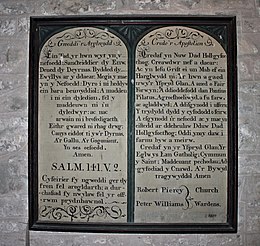Psalm 141
| Psalm 141 | |
|---|---|
| "Lord, I cry unto thee" | |
 Psalm 141:2 in Welsh on the boards on West wall (dated 1809). St Mary's Church, Cilcain Flintshire, North Wales. |
Psalm 141 is the 141st psalm from the Book of Psalms. In the slightly different numbering system in the Greek Septuagint version of the bible, and in its Latin translation, the Vulgate, this psalm is Psalm 140. It is attributed to David, a plea to God not only for protection from one's enemies, but also from temptation to sin.
Text[]
This psalm contains a prayer for deliverance from 'the enticements and the oppression of the wicked' and for seeking 'divine support to live a sinless life', probably a prayer of an ordinary worshipper, although it has some indications for being a "king's psalm" offered during 'a military campaign far away from Jerusalem' (such as that he cannot offer sacrifice in the temple in verse 2 and laments over battle losses in verses 7).[1]
| Verse | Masoretic Text[2] | King James Version |
|---|---|---|
| 1 | יְהֹוָ֣ה קְ֖רָאתִיךָ ח֣וּשָׁה לִּ֑י הַֽאֲזִ֥ינָה ק֜וֹלִ֗י בְּקָרְאִי־לָֽךְ [מִזְמ֗וֹר לְדָ֫וִ֥ד] | (A Psalm of David) Lord, I cry unto thee: make haste unto me; give ear unto my voice, when I cry unto thee. |
| 2 | תִּכּ֚וֹן תְּפִלָּתִ֣י קְטֹ֣רֶת לְפָנֶ֑יךָ מַֽשְׂאַ֥ת כַּ֜פַּ֗י מִנְחַת־עָֽרֶב | Let my prayer be set forth before thee as incense; and the lifting up of my hands as the evening sacrifice. |
| 3 | שִׁיתָ֣ה יְ֖הֹוָה שָׁמְרָ֣ה לְפִ֑י נִ֜צְּרָ֗ה עַל־דַּ֥ל שְׂפָתָֽי | Set a watch, O LORD, before my mouth; keep the door of my lips. |
| 4 | אַל־תַּֽ֚ט לִבִּ֨י לְדָבָ֪ר רָ֡ע
לְהִתְע֘וֹלֵ֚ל עֲלִל֨וֹת בְּרֶ֗שַׁע אֶת־אִישִׁ֥ים פֹּֽעֲלֵי־אָ֑וֶן וּבַל־אֶ֜לְחַ֗ם בְּמַנְעַמֵּיהֶֽם |
Incline not my heart to any evil thing, to practise wicked works with men that work iniquity: and let me not eat of their dainties. |
| 5 | יֶֽהֶלְמֵ֚נִי צַדִּ֨יק חֶ֡סֶד
וְיֽוֹכִיחֵ֗נִי שֶׁ֣מֶן רֹ֖אשׁ אַל־יָנִ֣י רֹאשִׁ֑י כִּי־ע֥וֹד וּ֜תְפִלָּתִ֗י בְּרָעֽוֹתֵיהֶֽם |
Let the righteous smite me; it shall be a kindness: and let him reprove me; it shall be an excellent oil, which shall not break my head: for yet my prayer also shall be in their calamities. |
| 6 | נִשְׁמְט֣וּ בִידֵי־סֶ֖לַע שֹֽׁפְטֵיהֶ֑ם וְשָֽׁמְע֥וּ אֲ֜מָרַ֗י כִּ֣י נָעֵֽמוּ | When their judges are overthrown in stony places, they shall hear my words; for they are sweet. |
| 7 | כְּמ֚וֹ פֹלֵ֣חַ וּבֹקֵ֣עַ בָּאָ֑רֶץ נִפְזְר֥וּ עֲ֜צָמֵ֗ינוּ לְפִ֣י שְׁאֽוֹל | Our bones are scattered at the grave's mouth, as when one cutteth and cleaveth wood upon the earth. |
| 8 | כִּ֚י אֵלֶ֨יךָ יֱהֹוִ֣ה אֲדֹנָ֣י עֵינָ֑י בְּכָ֥ה חָ֜סִ֗יתִי אַל־תְּעַ֥ר נַפְשִֽׁי | But mine eyes are unto thee, O GOD the Lord: in thee is my trust; leave not my soul destitute. |
| 9 | שָׁמְרֵ֣נִי מִֽידֵי־פַ֖ח יָ֣קְשׁוּ לִ֑י וּ֜מֹֽקְשׁ֗וֹת פֹּ֣עֲלֵי אָֽוֶן | Keep me from the snares which they have laid for me, and the gins of the workers of iniquity. |
| 10 | יִפְּל֣וּ בְמַכְמֹרָ֣יו רְשָׁעִ֑ים יַ֥חַד אָֽ֜נֹכִ֗י עַ֣ד אֶֽעֱבֽוֹר | Let the wicked fall into their own nets, whilst that I withal escape. |
Verses 6-7 ("When their judges are overthrown in stony places....") are likely corrupt, and scholars call their translation a best guess.[3]
Verses 8–10 express a plea for help against persecutors, in terms similar to Psalm 140 (cf. Psalm 35:8), and a wisdom teaching to be kept away from bad company (verse 4) is similar to Psalm 1.[1]
The gins (viz. engines) in the KJV text of verse 9 translates מקשות, rendered "traps" in more recent translations (NRSV, NASB).
Liturgy[]
As verse 2 compares prayer to an evening sacrifice, this psalm became part of Christian liturgy from an early time. John Chrysostom indicates that it was sung every day. As part of the liturgy practiced at Constantinople, it is preserved in the Liturgy of the Presanctified Gifts.
As part of the liturgy, it also has numerous musical adaptations, including Russian compositions (Да исправится молитва моя) by Dmitry Bortniansky, Mikhail Glinka, Aleksandr Grechaninov and Pavel Chesnokov. The Latin text (Dirigatur oratio mea) is adapted in a gradual by Johann Michael Haydn (MH 520) and in a motet by Orlande de Lassus.
The Lutheran Service Book and Evangelical Lutheran Worship feature the psalm prominently in their Evening Prayer services.
References[]
- ^ a b Rodd, C. S. (2007). "18. Psalms". In Barton, John; Muddiman, John (eds.). The Oxford Bible Commentary (first (paperback) ed.). Oxford University Press. p. 403. ISBN 978-0199277186. Retrieved February 6, 2019.
- ^ "Tehillim - Psalms - Chapter 141". Chabad.org. 2019. Retrieved January 26, 2019.
- ^ Clifford, S.J., Richard (1986). Collegeville Bible Commentary: Psalms 73-150. The Liturgical Press. p. 78. ISBN 0-8146-1480-9.
External links[]
| Wikimedia Commons has media related to Psalm 141. |
- Psalms
- Works attributed to David